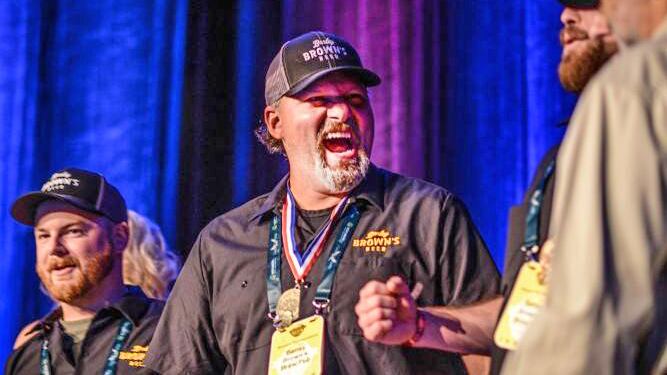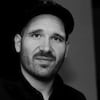You can't talk about Oregon IPA without talking about Tyler Brown.
And we're talking a lot about IPA this week. Willamette Week's fifth Beer Guide, featuring the best beer destinations in Oregon, hits stands this week. And our cover story anoints the best IPA made in Portland, as determined by a panel of experts who tried damn near every IPA made in the city and then sent the top 10 to a blind public judging.
So it makes sense to talk about Tyler Brown, who is arguably the best brewer of hoppy beers in the state, and whose Baker City brewpub turns 20 this year. Barley Brown's is also one of the great stories in Oregon beer. Brown's family are veterans of the restaurant industry who hopped from business to business before finally opening one of the state's great beer destinations.
In 2013, Brown took home gold in American India pale ale at the Great American Beer Festival, the most hotly contested category at the country's biggest, most prestigious beer competition.


Pallet Jack, which you'll now find on taps all around Portland, is one of only three Oregon IPAs ever to scale the highest peak in hopdom. (Pallet Jack followed BridgePort's 1997 win and preceded Breakside's win the following year.) Tyler Brown's brewpub was also named the best very small brewery in the country.
And it all happened because of a broken-down van. In 1974, the Brown family was moving from Connecticut to Seattle when their VW clunked out on the highway near Baker City. They liked the look of the place and decided to stay. It was a big adjustment for 7-year-old Tyler Brown.
"We lived in the edge of town in a motel called the Lariat Motel," he says. "I remember being signed up for school late—we missed the first few weeks—and showing up at school and telling the kids, with my East Coast accent, that my parents broke down here, we live here, and we live in the motel. And trying not to get beaten up."
Today, Brown's speech has the soft accent of the intermountain West. He might have spent his earliest years in Milford, with a dad from Philadelphia and a mom from New York City, but Brown has become fully inculturated in the ways of the Eastern Oregon town. In fact, he's pretty much the town mascot by owning the town's most prominent business and three restaurants in all—including Sumpter Junction, a train-themed diner on the edge of town, with hangover-curing eggs Benedict that are legendary in the beer industry.
After Brown persuaded kids not to beat him up, he had an idyllic childhood.
"You rode your bicycle to school, you rode your bicycle to the ball field," he says.
Not that it was easy for the Browns. When they first arrived, Tyler's dad, Bill, got a job as a farmhand driving a combine. Bill Brown had never worked on a farm, and the job was short-lived.
"Winter came and he got laid off, and when he got laid off, he went and applied for a job at a restaurant called Fancy Dan's," Brown says. "Fancy Dan's was very '70s—purple, orange, green, neon lights, cursive. I remember my dad's shift uniform was neon orange with a purple handkerchief thing and bell-bottoms."
But the Browns put down roots. Bill Brown eventually acquired partial ownership of a new truck stop on the edge of town and became an owner-operator for a decade. Then they opened a bakery downtown, which lasted until Safeway and Albertsons opened bakeries that undersold them. That evolved into a restaurant called Windmill Inn, which had a Dutch partner.
"Which, to this day, is still the corporate name," Brown says. "Employees get their paychecks, and it says, 'Windmill Enterprises,' and they ask why, and it's like, 'Eh, it's too long of a story.'"
The Windmill didn't work, but they turned it into a restaurant called the Brass Parrot.
"We tried all sorts of different concepts, from gourmet burgers, pizzas—I can't remember everything we tried doing," Brown says. "The thing that caught on and worked was Mexican food. Just by default, because there wasn't a Mexican restaurant in town, it worked. Until a family of Mexicans moved to town and opened a Mexican restaurant, and we couldn't compete."
That Mexican-run Mexican restaurant, El Erradero, is still in downtown Baker City—Tyler is a regular and good friends with the owner.
Around the same time, Brown got interested in homebrewing. He bought a homebrew kit in Boise, where he experimented with malt extract: "It was the best beer I ever had when I drank it," he says. "My friends didn't agree."
The idea of opening a brewpub was percolating. Brown, a vociferous reader, had seen an article about America's first modern brewpub, which had opened in 1982 in tiny Yakima, Wash. Yakima Brewing and Malting Company was owned by Bert Grant and survived 20 years, closing shortly after its founder's death in 2001.
"We talked about it long before we did it," Brown says. "Bert Grant started up this cool little thin, and that was the first brewpub I was aware of. I remember looking at it in the restaurant magazine, like Nation's Restaurant News or whatever you get, and it was on the cover. The way I looked at it, if Bert Grant could make that work in Yakima, which is a tiny town, I could do it."
Brown briefly moved to Florida, where he learned to become a Harley-Davidson mechanic—a skill he still uses as a dirt biker. When he came back to Baker City, he decided to open a brewery inside the family business downtown.


"It was like, 'We have a building, everything is in place, we just need to carve out a spot,'" he says. "We removed part of the kitchen and put the brewhouse inside, took out some of the booths from the dining room and put the fermentation out there, and just carved out this little space. The thinking was, back then, it was unique. People like unique."
But in 1998, Brown was finally ready to brew. Or almost ready to brew.
"Back then, it was the ATF that gave you your license. I had to wait for a guy to drive out from Seattle," Brown says. "It took me a lot of phone calls to get this guy. Our license wasn't valid until he signed off, so he came out to quiz me. He looked at the kegs to make sure they had the pregnancy warning on them. That's the only thing he actually looked for. He told me to pay all my taxes, because he would be very angry if he had to travel from Seattle back down here over a tax issue."
At first, the concept was a little too unique. At the time, people still conflated breweries with bars, and families didn't come in. The first three years "sucked," Brown says, before a critical mass developed around it. Then "it was like a light switch came on."

That switch has stayed on since. Since 2009, Tyler Brown's beers have won silver or better at every Great American Beer Festival except one, a rare distinction in blind-judged contests—with golds in everything from wheat beer to chili beer. His brewpub is also the biggest tourism draw in Baker City. Beer lovers regularly drive the five hours from Portland just to pay their respects.
When you go, make sure to get a hotel. If you manage to catch Brown at the brewery, he'll drink you right under the table.


